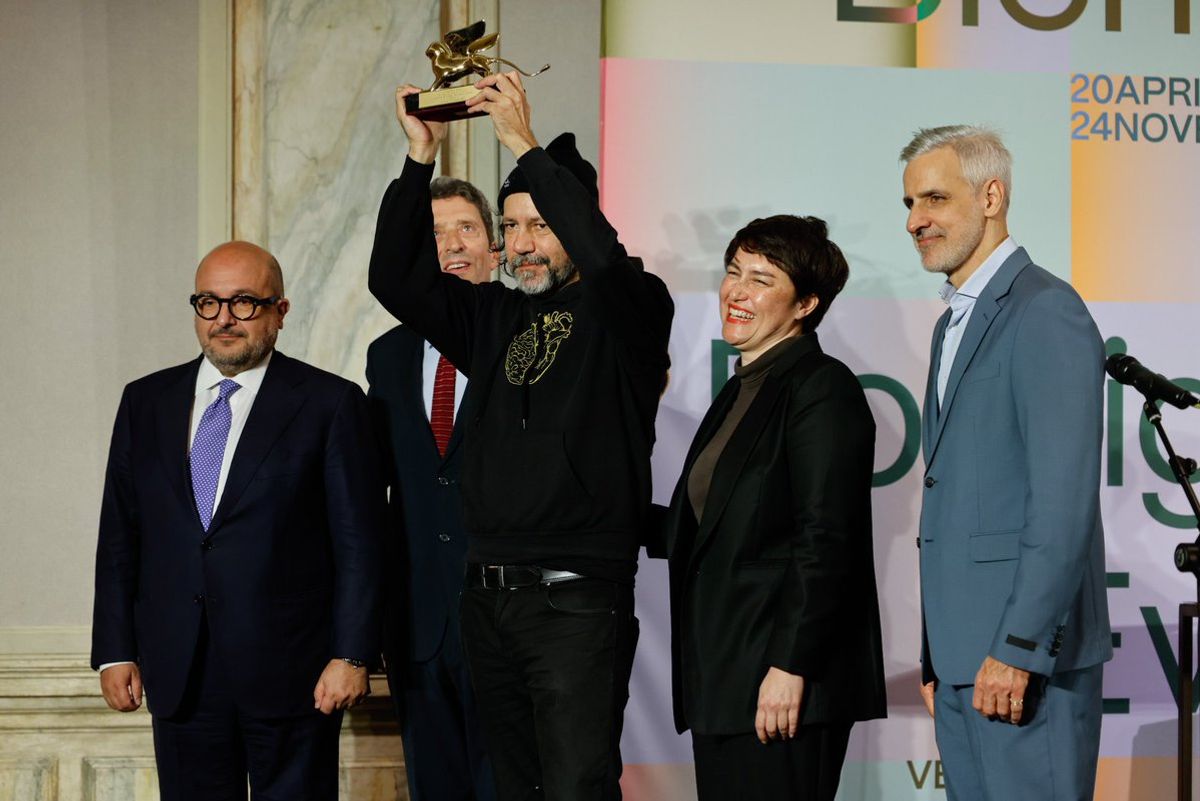Archie Moore of Australia has won the Golden Lion prize for Best National Participation at the 60th International Art Exhibition of La Biennale di Venezia (Foreigners Everywhere, 20 April-24 November). Moore, a First Nations Artist, is the first Australian to win the award.
In Moore’s work Kith and Kin, the artist has created a genealogical chart—in white chalk on black walls—tracing his Kamilaroi, Bigambul and British ancestry going back 65,000 years. It is both a celebration of First Nation Australian perceptions of lineage and connectivity and "a window onto deep trauma", say the organisers.
“In this quietly powerful Pavilion, Moore worked for months to hand draw with chalk a monumental First Nations family tree. Thus 65,000 years of history—both recorded and lost—are inscribed on the dark walls as well as on the ceiling, asking viewers to fill in blanks and take in the inherent fragility of this mournful archive,” said the judges in a statement.
Moore said: "Aboriginal kinship systems include all living things from the environment in a larger network of relatedness; the land itself can be a mentor or a parent to a child. We are all one and share a responsibility of care to all living things now and into the future."
Special mention was given to the Kosovo Pavilion for the installation The Echoing Silences of Metal and Skin. In the work, the artist Doruntina Kastrati examines the deregulation of the labour market in the aftermath of the 1999 Kosovo War. The piece “resonates in our bones, echoing a larger arena of feminist activism”, said the judges.
Mataaho Collective from New Zealand took the Golden Lion for best participant in the exhibition, Foreigners Everywhere curated by Adriano Pedrosa. In the Arsenale, the collective is showing Takapau (2022), a large-scale woven installation which is wrapped around the main entrance. A spokesperson for the group thanked “Pedrosa for uplifting so many Indigenous and queer voices”; Pedrosa said in his opening address in front of the Italian culture minister, Gennaro Sangiuliano, that it “was wonderful to see so many foreigners and Italians gathered here”.
The 87-year old, Jerusalem-born artist Samia Halaby and the Argentine artist La Chola Poblete also received special mentions for their work in Foreigners Everywhere. Halaby dedicated her award to “the youthful members of the press in Gaza”. In a video address, Halaby said that Pedrosa had brought “many stateless, indigenous artists to the Biennale”.
Poblete is “a transdisciplinary artist who works with performance, video art, photography, painting, and objects [presenting] sophisticated queer imagery”, according to the Biennale website. The Nigerian-British artist Karimah Ashadu won the Silver Lion for Promising Young Participant.
The Brazilian artist Anna Maria Maiolino and the Turkish artist Nil Yalter also received the prestigious Golden Lion awards for lifetime achievement. The artists made their debuts at this year’s Biennale. Pedrosa said that Maiolino “has become a reference for many generations of artists in Brazil and beyond”. She is presenting “a large-scale installation that continues and unfolds her sculptures in clay”, he added.
Yalter presents a new reconfiguration of her installation Exile is a hard job in the first room of the Central Pavilion at the Giardini. At the ceremony she dedicated her award to “peace in the world”. Pedrosa said: “She is widely regarded as a pioneer in the global feminist art movement”, adding that she is recognised for her important research linked to immigration.


